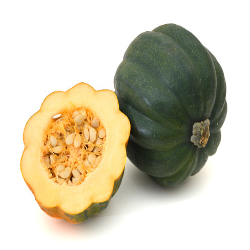Acorn squash Nutrition facts
Acorn squash

Acorn squash is another popular winter-squash variety vegetables like pumpkin, and butternut squash in the US. The squash is named so because of its shape; disc like flat upper end, and angled, elongated lower pavilion.
Botanically, it belongs to the Cucurbitaceae (Gourd family) of vegetables, and closely related to other winter squash varieties such as pumpkin, delicata, butternut squash, hubbard, spaghetti, Japanese kuri hokkaido, calabaza, etc.
Scientific name: C. pepo var. turbinata.
Similar Food
-
 Amaranth greens 23 Cal
Amaranth greens 23 Cal -
 Artichoke 47 Cal
Artichoke 47 Cal -
 Arugula 25 Cal
Arugula 25 Cal -
 Asparagus 20 Cal
Asparagus 20 Cal -
 Bamboo shoots 27 Cal
Bamboo shoots 27 Cal
Source of Calorie
40
Calories
-
Carbs10.42 g 91%
-
Protein0.80 g 7%
-
Fat0.10 g 2%
How long to burn off 40 Calories?
*Approximate base minutes for a 25-year-old, 65 kg adult at moderate intensity.
Swimming
7
min
Jogging
6
min
Cycling
6
min
Walking
10
min
| Nutrition Principle | Nutrition Value | Percentage of RDA |
|---|---|---|
| Principle | ||
| Energy | 40 Kcal | 2% |
| Carbohydrates | 10.42 g | 8% |
| Protein | 0.80 g | 1% |
| Total Fat | 0.10 g | <1% |
| Cholesterol | 0 mg | 0% |
| Dietary Fiber | 1.5 g | 4% |
| Vitamins | ||
| Folates | 17 μg | 4% |
| Niacin | 0.700 mg | 4% |
| Pantothenic acid | 0.400 mg | 8% |
| Pyridoxine | 0.154 mg | 12% |
| Riboflavin | 0.010 mg | <1% |
| Thiamin | 0.140 mg | 12% |
| Vitamin-A | 367 IU | 12% |
| Vitamin-C | 11 mg | 18% |
| Electrolytes | ||
| Sodium | 3 mg | <0.5% |
| Potassium | 347 mg | 7% |
| Minerals | ||
| Calcium | 33 mg | 3% |
| Iron | 0.70 mg | 9% |
| Magnesium | 32 mg | 8% |
| Manganese | 0.167 mg | 6% |
| Phosphorus | 36 mg | 5% |
| Selenium | 0.5 µg | <1% |
| Zinc | 0.13 mg | 1% |
| Phyto-nutrients | ||
| Carotene-ß | 220 μg | -- |
| Crypto-xanthin-ß | 0 μg | -- |
| Lutein-zeaxanthin | 38 μg | -- |